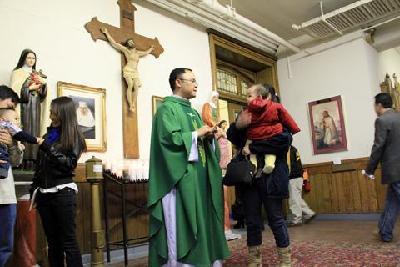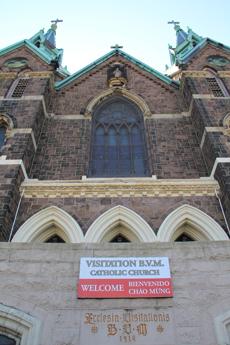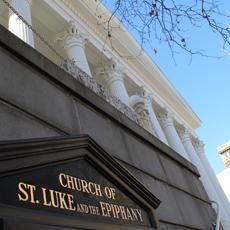
Religious congregations help the homeless, provide counseling, offer spiritual guidance and celebrate life cycle events. Churches and synagogues have played these roles for hundreds of generations. But for the first time, a new study has put an economic value on those contributions.
After struggling with AIDS since the mid-80s, Dennis Wright met with a few support groups, but says he wanted something on a more spiritual level.
"I lost a partner when I came here, I was very much in need of a place," he says.
That's when he joined the Hospitality Center at Saint Luke and the Epiphany Church in Philadelphia. The group offers faith-based comfort for people living with AIDS. There is no fee to participate, and Wright admits he never thought about the value of being part of that group.
"A dollar value? I don't know what I would put for that. I owe my life to it (the church)."
Holy finance
But Ram Cnaan says he can put a price tag on goodwill and, in a study called "Valuing Urban Congregations," he did.
"If you ask yourself 'What is the financial value of feeling good?' it's very hard to quantify because there is no real understanding of what feeling good means and how to pay for it," Cnaan is a professor of social policy at the University of Pennsylvania.
He calculated the economic worth of a dozen places of worship around Philadelphia, including Catholic, Protestant and Jewish congregations. "Everybody thinks of congregations as a place people come to worship and meet their spiritual needs and go home. Congregations have a much wider impact on the community."
Cnaan says the monetary value of that impact has always been considered too sacred to measure. But Bob Jaeger, who also worked on the study, hopes their findings will help churches around the country exert more influence during neighborhood planning.
Jaeger is president of Partners For Sacred Places, a national non-sectarian organization that promotes houses of worship as community assets.
"All too often when we invest in neighborhoods, the church or synagogue is overlooked. We just assume that it's always going to be there. We don't fully understand what value it has. If a pastor persuades someone to not commit suicide, what is the value of a human life? What's the dollar value, how many millions of dollars?"
According to the study, preventing a suicide is worth about $20,000 while counseling that saves a marriage has a value of $18,000.

'Halo effect'
The researchers give a price tag to just about anything that interacts with a congregation. They considered a total of nearly five-dozen categories, from the money churches receive for performing funerals and weddings, to the salaries they pay their staff, to the social values and principles they promote and foster.
Jaeger calls this value its halo effect. "We thought there probably would be some evidence that in a halo of a block or two or more - in a circle around a sacred place - there is probably some impact that is demonstrable, and what we've learned, in fact, is that much of this impact is local."
For instance, helping 100 people find jobs made up more than half of Calvary Methodist Church's $2.6 million halo. The 150-member Summit Presbyterian Church houses a day-care center, a room used by a Jewish congregation as a synagogue, and a martial arts program. Despite the church's operating budget of only $265,000, the study values its halo at almost $1.5 million dollars.
The brightest halo in the study - more than $22 million - surrounds Visitation Parish. It includes a church, a community center and a school with nearly 500 students. Located in a diverse neighborhood of Philadelphia, it celebrates mass in English, Spanish and Vietnamese.

The study won't be published for about two months, but a report of its findings recently appeared in the Philadelphia Inquirer, and not everyone was pleased with its numbers.
"I opened it up and I smiled. I thought, 'Oh great, they're going to have this great stuff about St. Luke and the Epiphany about how important we are in the neighborhood,'" says Rodger Broadley, who has served as pastor at St. Luke for almost three decades. "And then I got to the bottom of the page and I zipped down to the bottom of the list of 12 churches, and there we were at the very bottom as a negative $250,000."
That's because the value of a church's services to its community was offset by a loss of property tax revenue. Religious congregations are exempt from paying taxes, and St. Luke is located in a wealthy area of Philadelphia. So its tax-free property value dramatically hurt its score.
Cnaan says recalculating the numbers to account for that would move St. Luke far into the positive column, with a value to its community of $1.25 million, and that, Cnaan says, is an important number. "The value congregations bring to the city far outweigh the tax loss congregations bring to the city.
In fact, Cnaan estimates that all of Philadelphia's 2,000 houses of worship bring the city the equivalent of $250 million a year. And that's something everyone can say "Amen" to.
synagogue: a building where Jews meet for religious worship and teaching 猶太會(huì)堂;猶太教堂
Presbyterian: a member of a branch of the Christian Protestant Church that is the national Church of Scotland and one of the largest Churches in the US. It is governed by elders who are all equal in rank. 長(zhǎng)老派成員(長(zhǎng)老會(huì)為蘇格蘭國(guó)教及美國(guó)最大教會(huì)之一)
Epiphany: a Christian festival, held on the 6 January, in memory of the time when the Magi came to see the baby Jesus at Bethlehem 顯現(xiàn)節(jié),主顯節(jié)
Harvard grads choose public service over big bucks
Mentors try to improve lives of homeless children
英國(guó)國(guó)教會(huì)失誤致100萬(wàn)宗婚姻無(wú)效
(來(lái)源:VOA 編輯:崔旭燕)
